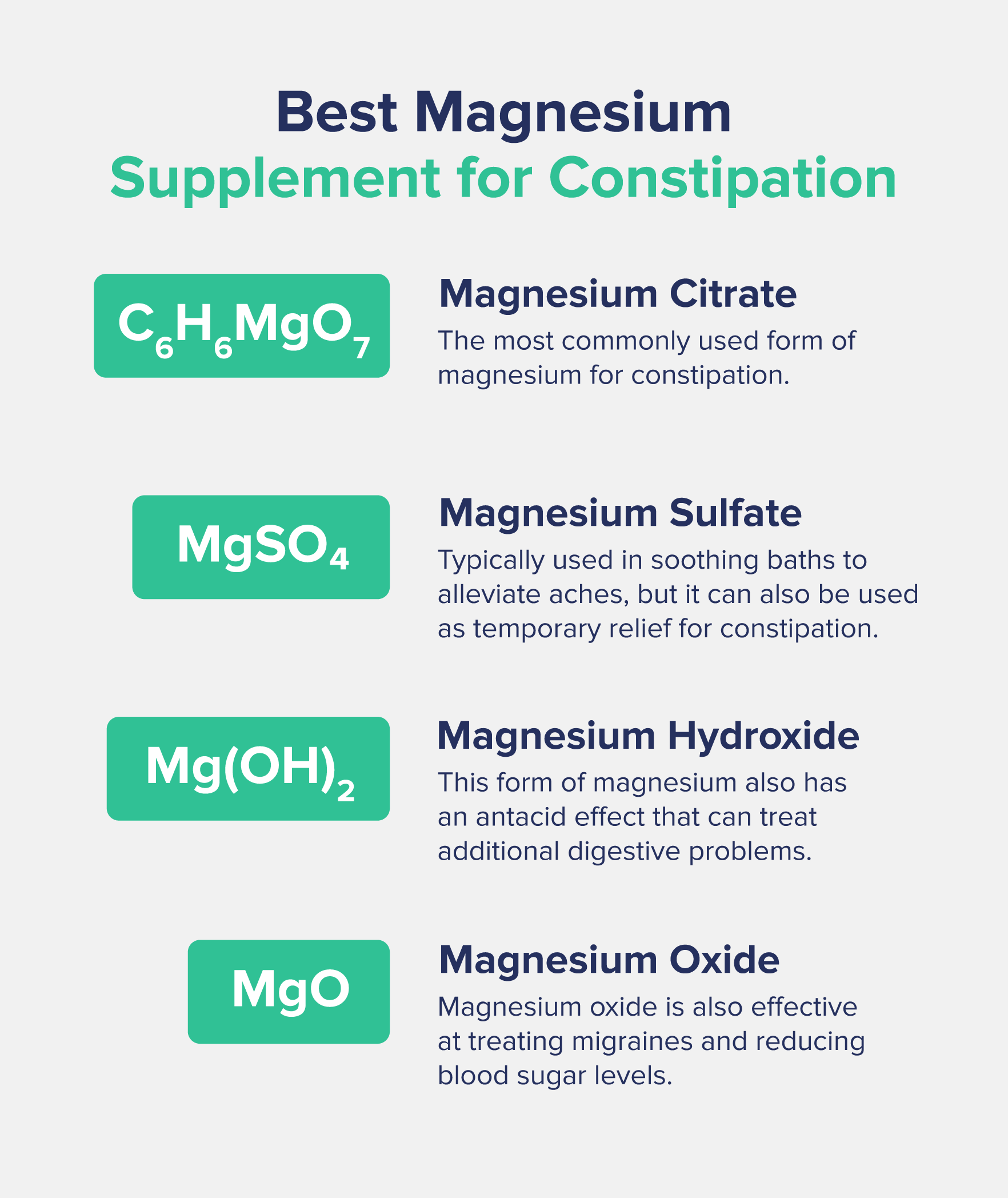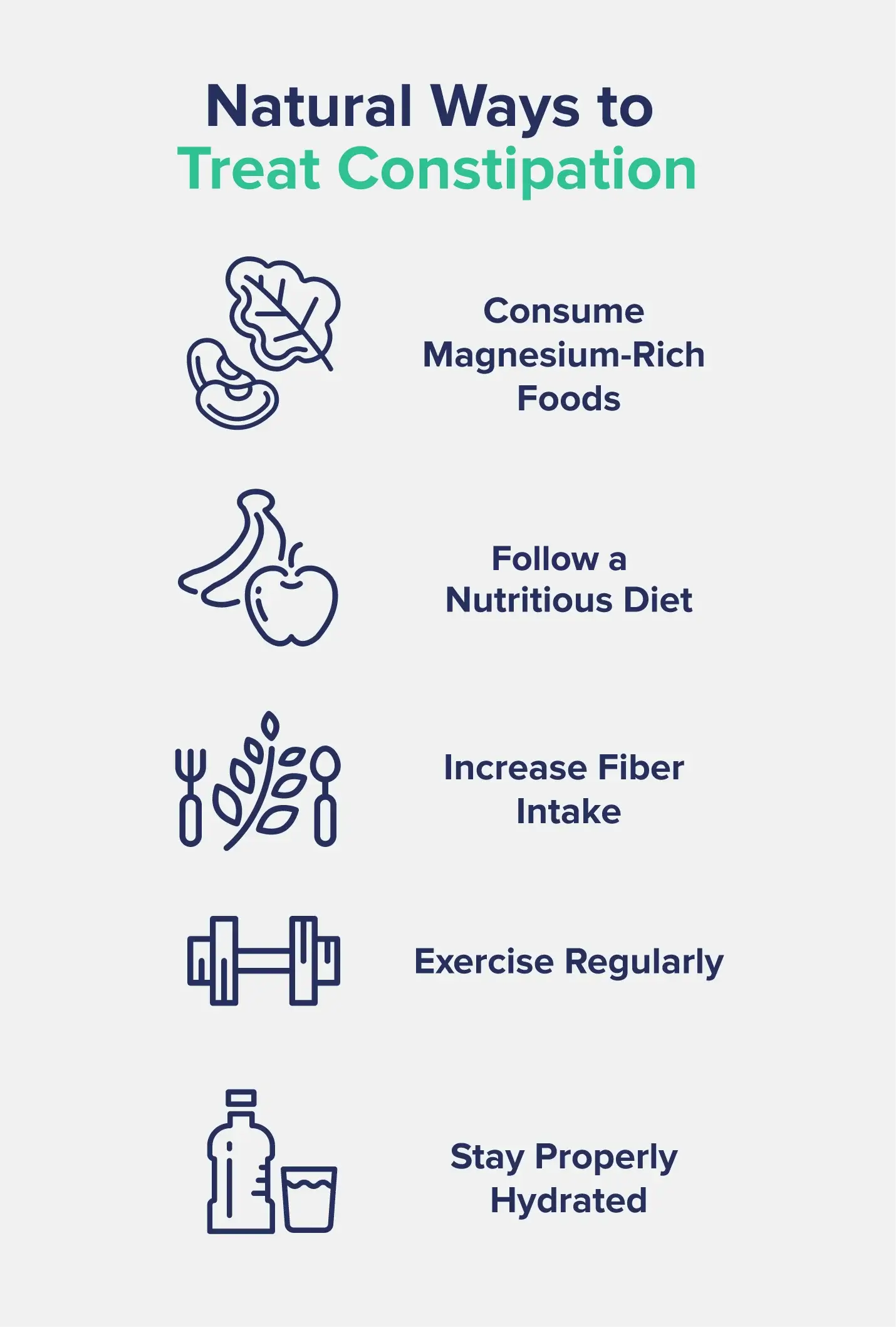Try our favorite, clean protein powder: See our top pick →
Try our favorite, clean protein powder: See our top pick →
This post contains links through which we may earn a small commission should you make a purchase from a brand. This in no way affects our ability to objectively critique the products and brands we review.
Evidence Based Research To fulfill our commitment to bringing our audience accurate and insightful content, our expert writers and medical reviewers rely on carefully curated research.
Read Our Editorial Policy
Everybody poops, and yet the topic of constipation can still be an uncomfortable one.
Luckily, you can easily treat constipation at home with a few over-the-counter medicines or supplements such as magnesium.
If you’re experiencing chronic constipation, it’s better to speak with your doctor first.
However, for the occasional constipation relief, magnesium supplements might just be the answer you’ve been looking for.
In this article, we will cover everything you need to know about constipation and how to treat it by taking magnesium.
We will explain how magnesium works, the types available, and how much you can take to get the relief you need and get back to your usual bathroom habits.
Before we dive into how magnesium can be used for constipation, let’s briefly cover what exactly constipation is.
First off, constipation is extremely common. In fact, 16% of adults in the U.S. experience constipation, with that figure rising to 33% in adults 60 years and older.
Constipation is defined as having difficulty in passing stool or having fewer than three bowel movements per week.
Per the Mayo Clinic, other symptoms include:
You need to see a doctor if you’re experiencing constipation that’s causing you intense abdominal discomfort, painful bloating, unexplained weight loss, vomiting, or blood in the stool.
Additionally, there is cause for concern you’ve been unable to resolve your constipation symptoms at home within three weeks.
Constipation occurs when stool moves too slowly in the large intestine and the body absorbs too much water from the stool. This causes it to become hard and dry and difficult to pass from the colon.
This slowdown in the large intestine can be caused by a diet lacking dietary fiber, dehydration, and a lack of exercise. It can also occur if you don’t use the toilet when you need to go number two.
Have you ever felt constipated after traveling on a long flight or road trip? It’s likely because you’re dehydrated and haven’t moved around as much.
Notice you get backed up after a stressful event? Well, when you’re stressed, the body releases a hormone that directly impacts your intestines, causing a slowdown that results in constipation.
Unfortunately, constipation can also be caused by dysfunction of your digestive system or other diseases such as Irritable Bowel Syndrome (IBS), diabetes, and hypothyroidism.
If you identify with the former categories of constipation (where you only experience it occasionally), then you can treat it at home without having to consult your doctor.
However, we recommend you try the natural ways first: eating a varied diet with lots of dietary fiber, exercising, and drinking plenty of water.
However, if that doesn’t work and you’ve got more bowel traffic instead of bowel movement, magnesium can help relieve constipation and get you on a more regular bathroom schedule.
Magnesium supplements are a tried-and-tested way to relieve stubborn and uncomfortable constipation that doesn’t seem to resolve with increased intake of fluid or exercise.
It works as an osmotic laxative, meaning it pulls water into the intestines from the body, creating what’s called intestinal lumen fluid.
Magnesium also causes muscle relaxation, facilitating intestinal muscle contraction along the digestive tract, promoting regular bowel movements, and relieving constipation.
But it doesn’t just treat constipation. Magnesium also plays a role in regulating digestive enzymes that encourage good digestion and nutrient absorption. A deficiency in magnesium has also been shown to upset our gut microbiome, which can lead to Irritable Bowel Syndrome.
There is plenty of scientific evidence of the benefits and medical uses of magnesium, but deciding which magnesium to take can be tricky since magnesium comes in more than one form.
While most have some digestive effects, only a few are really optimal for treating constipation.

Magnesium citrate (citroma) is the most commonly used form of magnesium for constipation. You can find it in nearly every local grocery store or market.
This form of magnesium is bound to citric acid, hence the name magnesium citrate, and is typically sold as citroma magnesium citrate liquid, which you can drink to encourage a bowel movement.
It’s pretty effective and gentle, so it won’t cause the urgency some laxatives might induce.
As with any laxative, magnesium citrate is only recommended for occasional constipation.
Though rare, magnesium citrate may cause some serious side effects. If you experience nausea, vomiting, blood in the stool, stomach pain, or fainting, stop taking it and call your doctor.
Though magnesium sulfate, better known as Epsom Salt, is typically used in soothing baths to alleviate aches, pains, and muscle soreness, it can also be used as temporary relief for constipation.
While you can take magnesium sulfate orally, either with capsules or 2 to 4 teaspoons mixed into water (for adults), you can also absorb it through the skin in a bath, which may help relieve constipation. If your Epsom Salt is meant to be explicitly used for bathing—such as Dr. Teals—don’t drink it. It may have additional scents or oils not meant for human consumption.
Magnesium hydroxide, commonly known as Milk of Magnesia, is another popular over-the-counter magnesium supplement that can treat constipation.
This form of magnesium also has an antacid effect that can treat additional digestive problems such as heartburn, indigestion, and upset stomach.
Magnesium oxide is the dry, tablet form of magnesium hydroxide and has been a popular way to treat constipation for hundreds of years, especially in East Asia.
Despite its low bioavailability—meaning the body cannot absorb it as well as other forms of magnesium—it is also used to treat magnesium deficiencies. Magnesium oxide is also effective at treating migraines and reducing blood sugar levels and blood pressure.
There are many other magnesium supplements available. They each have some health benefits, some of which include relieving constipation, but they are not the best option in comparison to the previous forms of magnesium mentioned:
When it comes to laxatives like magnesium, it is essential to read the manufacturer’s label closely, as each brand will have different concentrations for their tablets or liquids. Adjust your dosage accordingly—especially for children.
Do not take more than 350 milligrams of magnesium per day. Some studies administer higher doses to participants, but this is typically done under doctor supervision.
If you’re taking a liquid form of magnesium (such as magnesium citrate or magnesium hydroxide), use an actual measuring spoon, not just a house spoon.
If you have a food scale and there are milliliter or fluid ounce dosages provided on the product, all the better, as this is much more accurate than measuring by volume.
Though magnesium toxicity is rare, taking too much magnesium can have serious side effects, so it’s important to get your dosage correct.
Taking laxatives to treat your constipation doesn’t come without its risks. This is why it’s recommended to try natural methods first, as laxatives can be pretty harsh on the body.
The most common side effects of magnesium supplements are:
Taking magnesium can also slow the absorption of antibiotics and blood pressure medications and interfere with insulin, heart medications, diuretics, and reflux medications.
If you have kidney disease or myasthenia gravis (a neuromuscular disease), avoid taking magnesium supplements.
If your constipation is not severe enough to take laxatives or you aren’t keen on taking a medication (even an OTC) to address the problem, there are a few ways to promote bowel movements naturally.

One serving contains:
Eating more fiber-rich foods is by far the best way to improve bowel movement regularity and avoid constipation.
Many of the magnesium-rich foods above are already high in fiber, so just be sure to add more veggies and complex carbohydrates, and you’ll be on your way to a better bathroom experience in no time.
Not to beat a dead horse here, but you can easily avoid constipation by eating a varied and nutritious diet.
By getting more fresh vegetables, fruits, protein, and complex carbohydrates into your diet, you will naturally increase your magnesium intake (along with other vital nutrients) and stop constipation before it starts.
Yup, getting regular exercise can keep you regular, too.
This study from 2017 suggests that we still don’t know exactly what mechanism in our body causes this.
However, the prevailing theory suggests that the colon responds to movement, so when we exercise, waste moves more quickly through our digestive system, preventing the absorption of water that would lead to constipation.
This is most important for those who are particularly sedentary, such as older adults.
When dehydrated, our bodies will start scavenging water from wherever they can get it, including our waste.
This absorption of water into our intestinal walls is one of the primary causes of constipation.
Ipso facto, drink more water and avoid constipation. This is key to maintaining a healthy hydrated digestive system and for other bodily functions as well.
Magnesium citrate, magnesium sulfate, magnesium hydroxide, and magnesium oxide are all highly effective over-the-counter medications for constipation.
The dosage of magnesium will depend on the manufacturer’s recommendations, but it is generally recommended not to take more than 350mg per day for adults.
Yes. Magnesium can alleviate constipation because it is an osmotic laxative that pulls water into the intestines. This loosens stool in the large intestine and—along with magnesium muscle relaxant effects—makes it easier to pass from the colon.
Depending on the form of magnesium and the severity of the constipation, it can take anywhere from 30 minutes to 3 hours. If you do not have a bowel movement after 6 hours, it might be time to contact your doctor.
Both effectively treat constipation, but magnesium citrate is the most popular laxative treatment since the body much more easily absorbs it than magnesium oxide.
Maintaining a varied diet full of fiber and magnesium-rich foods, drinking water regularly, and exercising are all proven ways to encourage regular bowel movements naturally.
Magnesium-rich foods include:
• Pumpkin seeds
• Almonds
• Spinach
• Cashews
• Black beans
• Edamame
• Dark chocolate
• Avocado
• Potato
• Yogurt
• Oatmeal
There are many reasons one might become constipated. However, the most common causes are a diet insufficient in dietary fiber, dehydration, and a lack of exercise. It can also occur if you don’t use the toilet when you need to go number two. Constipation can also be caused by sitting for extended periods, stress, and diseases like IBS, diabetes, and hypothyroidism.
Subscribe now and never miss anything about the topics important to you and your health.